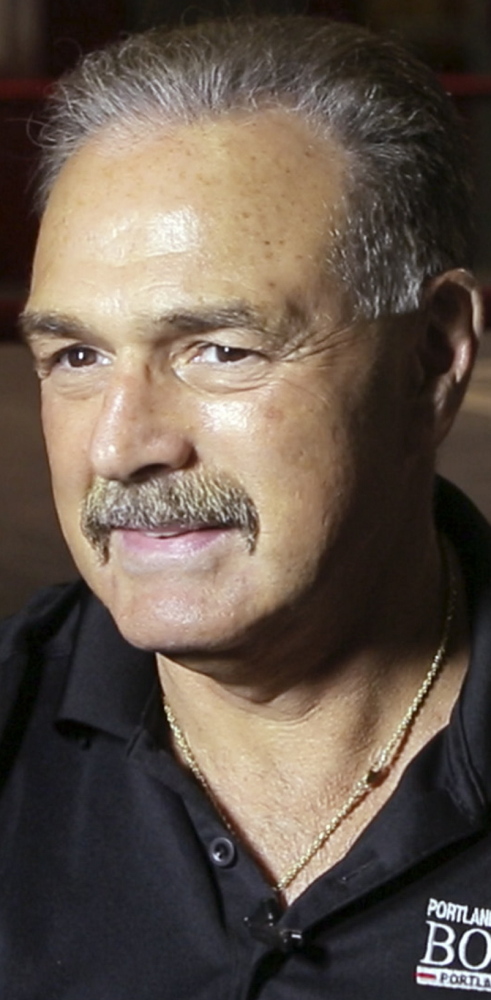Bobby Russo – coach, promoter and manager of the Portland Boxing Club – knew this day would come.
Muhammad Ali’s health had been failing, Parkinson’s disease taking a toll on that once-chiseled body, but still, the death on Friday of the former heavyweight champion of the world hit Russo hard.
“I’m sad,” Russo said Saturday. “He was my sports hero, just an iconic personality.”
As a 9-year-old in 1965, Russo watched from ringside when a brash young boxer formerly known as Cassius Clay knocked out Sonny Liston in a controversial bout moved to Lewiston from Boston.
Russo’s uncle, George, was the state boxing commissioner in Maine. Neither he nor Russo’s father were initially enamored with Ali, the polar opposite of most boxers who preceded him, the strong, silent types who let their managers do the talking.
“Those guys, they didn’t say anything,” Russo said. “They sat in the corner with a towel over their heads until they were introduced, then just went out and fought.”
Not Ali. He danced. He called himself pretty. He tossed off rhyming couplets. He was anything but humble.
“He called himself ‘The Greatest’ as a boxer,” Russo said, “but he became ‘The Greatest’ in a number of ways: for his race, for peace and for general goodwill.”
Two years after the bout in Lewiston, Ali refused induction into the Army because of his religious beliefs (his name change came after he joined the Nation of Islam in 1964) and his opposition to U.S. involvement in the Vietnam War. That stance led to his arrest and conviction of draft evasion and cost him his heavyweight title. He went nearly four years without a bout, at the height of his athletic prowess.
“It was really something when a 20-something-year-old guy who was heavyweight champion and could cash in on that, to pass on that title and potentially go to prison,” Russo said. “Of course, he wasn’t going to go to war. They would have given him a uniform and brought him around and had him shake hands with people. But he wouldn’t do that. He would not sell out his character or relinquish his principles or his beliefs.”
The Supreme Court overturned Ali’s conviction in 1971 and he regained his title in 1974. In an era when African-Americans were struggling for civil rights, here was an Olympic gold medalist (1960, light heavyweight division) and unapologetic self-promoter who backed up his outlandish words with electrifying deeds and delighted in antagonizing the (almost entirely white) powers that be. He was Black Power personified, not just in the United States but around the world.
“He was a great athlete, a great boxer, but he was very much more,” Russo said. “He gave millions to charity. He was an ambassador of goodwill and a great humanitarian. He was the face of the Sixties.”
Russell Lamour Jr., a Deering High graduate and former North American middleweight champion, has a bout scheduled later this month at the Androscoggin Bank Colisee – known as St. Dominic’s Arena when the Ali-Liston rematch was held there half a century ago, a bout that lasted less than two minutes.
“To be able to win my fight where he fought, that means a lot,” said Lamour, who is scheduled to face Roberto Valenzuela of Mexico. “He is one of the top two boxers that I look up to – Muhammad Ali and Sugar Ray Leonard.”
Ali changed the stereotype of the lumbering heavyweight, Lamour said, with his footwork, jab and agility.
Even those of Russo’s father’s generation came around on Ali.
“After years passed, no matter what they thought of him earlier, that generation gave him respect for being a man of character,” Russo said. “He was the most recognizable face on earth. He was really something special.”
Glenn Jordan can be contacted at 791-6425 or
Gjordan@pressherald.com
Twitter: GlennJordanPPH
Send questions/comments to the editors.



